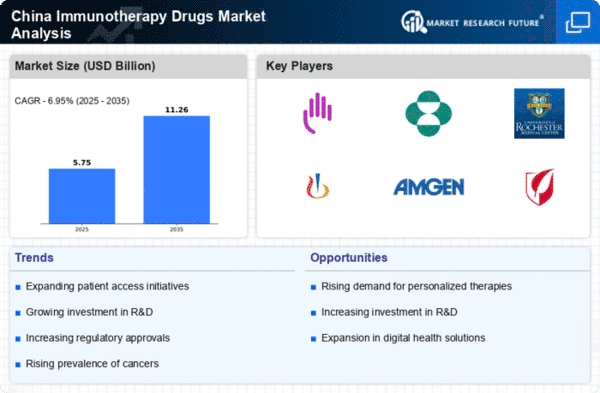Increasing Cancer Incidence
The rising incidence of cancer in China is a critical driver for the immunotherapy drugs market. With cancer cases projected to reach approximately 4.6 million by 2025, the demand for innovative treatment options is escalating. This alarming trend compels healthcare providers and pharmaceutical companies to invest in immunotherapy, which has shown promising results in treating various malignancies. The Chinese government has recognized this urgency, leading to increased funding for cancer research and the development of immunotherapeutic agents. As a result, The immunotherapy drugs market is likely to expand significantly, driven by the need to address the growing health crisis of cancer.
Rising Investment from Private Sector
Investment from the private sector is emerging as a significant driver for the immunotherapy drugs market in China. Venture capital firms and private equity investors are increasingly funding biotechnology companies focused on developing innovative immunotherapeutic agents. This influx of capital is crucial for accelerating research and development efforts, enabling companies to bring new therapies to market more rapidly. Additionally, partnerships between established pharmaceutical companies and startups are fostering collaboration and knowledge sharing, further enhancing the innovation landscape. As private sector investment continues to grow, the immunotherapy drugs market is expected to thrive, leading to the introduction of novel treatment options.
Government Support and Policy Initiatives
Government initiatives in China play a pivotal role in shaping the immunotherapy drugs market. The Chinese government has implemented various policies aimed at accelerating the approval process for new drugs, particularly in the field of immunotherapy. For instance, the National Medical Products Administration (NMPA) has streamlined regulatory pathways, which has led to a surge in the number of approved immunotherapeutic agents. This supportive regulatory environment encourages both domestic and international pharmaceutical companies to invest in research and development, thereby enhancing the availability of innovative treatments. Consequently, the immunotherapy drugs market is poised for substantial growth as these policies foster a conducive atmosphere for innovation.
Technological Advancements in Drug Development
Technological advancements are significantly influencing the immunotherapy drugs market in China. Innovations in biotechnology, such as CRISPR and next-generation sequencing, are enabling researchers to develop more effective immunotherapeutic agents. These technologies facilitate the identification of novel targets for immunotherapy, leading to the creation of personalized treatment options. Moreover, the integration of artificial intelligence in drug discovery processes is streamlining the development of new therapies. As these technologies continue to evolve, they are likely to enhance the efficacy and safety profiles of immunotherapy drugs, thereby attracting more patients and healthcare providers to this burgeoning market.
Growing Awareness and Acceptance of Immunotherapy
There is a notable increase in awareness and acceptance of immunotherapy among healthcare professionals and patients in China. Educational campaigns and successful case studies have contributed to a better understanding of the benefits of immunotherapy, leading to a shift in treatment paradigms. As more oncologists recognize the potential of immunotherapeutic agents, the demand for these treatments is expected to rise. This growing acceptance is further supported by positive clinical outcomes, which bolster confidence in immunotherapy as a viable treatment option. Consequently, the immunotherapy drugs market is likely to experience robust growth as awareness continues to expand.
















